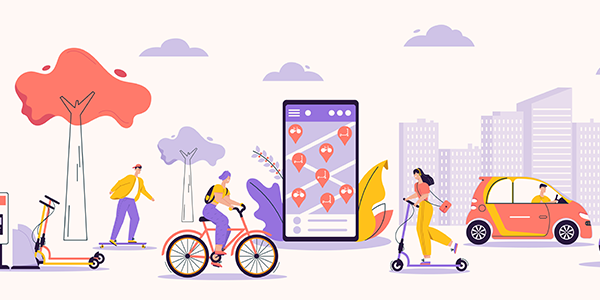
"The system almost runs by itself, and that helps us all make significant progress."
Scheidt & Bachmann introduced its parkoneer solution in the car parks at its headquarters in Mönchengladbach over a year ago. A lot has happened since then: a bicycle parking area has been built instead of parking spaces, one parking area will be completely removed and used for a different purpose and yet the number of parking authorisations issued continues to rise. Stefan Hirsch, member of the works council, explains why and how this has been achieved in an update interview.
Mr Hirsch, a year ago we talked about the introduction of the digital car park management system ‘parkoneer’ at Scheidt & Bachmann's headquarters. At the time, you mentioned that it had increased the utilisation of parking spaces and enabled more parking permits to be issued. What else has happened since then?
Stefan Hirsch: Since then, we have introduced the concept of ‘flex parking’. Together with the management, we decided to initially test it on a small scale. Specifically, we gave 80 employees the opportunity to book parking spaces in advance. These bookings can be made for around 14 days in advance. The advantage is that the parking spaces can be used by other employees on days such as home office, illness or holidays. We will now expand this to a greater extent, especially as we will lose one car park space as we will be using it for our production. I am very confident that we will be able to accommodate even more employees in the central car park by booking in advance.
That sounds like an exciting development. Are there already concrete plans for how the relationship between employees who use the flex product and those who have permanent authorisation will be structured?
Our aim is not to cause any confusion among the workforce. Employees who already have a permanent parking space will be gradually informed about the new options. New employees will be accepted directly into the Flex programme. It is already apparent that we could actually admit all 1,300 employees at the site to our central car park with 500 spaces.
How is the new system being received by employees? Are there differences in the departments?
The system has been very well received by employees. Employees are getting on well with the car park portal. It is also going well in production, even if the introduction there is more complex. We are currently adapting the Flex model to shift times to make it easier for employees in production to use. The usability of the tool is well described and easy to use.
Has the general satisfaction of employees with the car park facilities also improved?
Absolutely. We used to have to spend a lot of time manually maintaining Excel lists and old programmes every day. Today, the car park portal takes this work off our hands. The employees are responsible for their own bookings and the system runs largely smoothly. One point that some people see as a shortcoming is that you can't cancel a parking space on the same day. But this is actually the company's intention in order to avoid chaos. The system simply gives the car park management options as to how the booking options are managed by companies in order to optimise capacity utilisation. Overall, booking is even a motivator and there is actually a greater commitment to using the spaces.
You mentioned that one parking space will be removed, and yet more authorisations are to be issued for the central car park. Are there any plans for how the data from car park management will be handled?
Yes, we have already taken some measures. For example, we have given special permits in our car park to people who take their children to kindergarten in the morning and would not be able to find a parking space afterwards. Such flexible solutions still offer a lot of potential.
What is another application example?
We recently made the car park available to a club on Saturdays and Sundays because they didn't have enough parking spaces for their event. The car park was almost completely full on both days. Such co-operations are certainly conceivable more often in the future.
Since the introduction of parkoneer, a bicycle parking area has also been built in the central car park, for which car parking spaces have been eliminated. Have the changes had a noticeable impact?
The bicycle car park was built on an area that used to have 15 parking spaces, but this has not caused any problems for parking. Although we have issued over 250 more parking authorisations than we actually have parking spaces, the system is running smoothly. This also shows how well the Flex system works.
Finally, how much time has the new system saved you personally in your role as car park manager?
I used to spend about 30% of my working time managing the car parks, now it's less than 5%. The system almost runs itself and that helps us all a lot.
Thank you very much, Mr Hirsch, for the interview. It's impressive to see how well digital car park management works and the positive impact it has on the location.
Thank you very much, I'm delighted that the system has been so well received. It's really fun to work with it.

